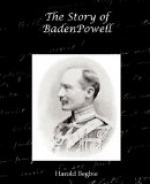Our interest’s on the
dangerous edge of things,
The honest thief, the tender
murderer,
The superstitious atheist,
demireps
That love and save their souls
in new French books—
We watch while these in equilibrium
keep
The giddy line midway:
one step aside,
They’re classed and
done with.
This is all very well in fiction, but I protest it is a little hard on the soldier, and it is certainly a dangerous belief for the future officer to grow up in.
The following letter, which appeared recently in the Daily Graphic, is well and truly written: “Having served as chaplain of one of the largest recruiting depots in England, may I thank you for your article on the Heroic Blackguard style of literature in vogue just now. Soldiers have often remarked to me that they were represented as ‘drunken roughs who couldn’t speak the Queen’s English.’ As a matter of fact, a steadier, better behaved, better mannered class it would be difficult to find. There are exceptions, but not popular exceptions. Blackguardism and heroism very seldom go together, Bret Harte and other writers notwithstanding. The pluckiest and most reliable soldiers are not animated beer barrels, but sober, keen-eyed, sensible fellows, and of such the British Army chiefly consists.”
When you are most inclined to think the Private an irresponsible good-for-nothing, look hard at the next Commissionaire you meet on the street. That smart, clean, well-brushed man, with his bronzed face, his bright keen eyes, and general look of self-respect, was once a soldier, and indeed it is soldiering that has made him what you see. Look hard, honoured sir, at the next Commissionaire who comes across your path, and you will never again be disposed to regard the soldier as an insensate good-for-nothing.
“Tommy Atkins,” says Baden-Powell, “is not the childish boy that the British Public are too apt to think him, to be ignored in peace and petted in war. He is, on the contrary, a man who reads and thinks for himself, and he is keen on any instruction in really practical soldiering, especially if it promises a spice of the dash and adventure which is so dear to a Briton.” It was just because Baden-Powell acted on this assumption in the 13th Hussars that the men learned to “worship” him. The few regular bad-lots that are to be found, I suppose, in every regiment, are certainly no heroes among the rest of the soldiers. The corner in the canteen where they foregather is not crowded, and I have seen them from that unsplendid isolation looking wistfully at the fresh, clean, merry-voiced troopers buying “luxuries” at the bar,—men who are keen soldiers, anxious to excel, and who do not “nurse the canteen.”




